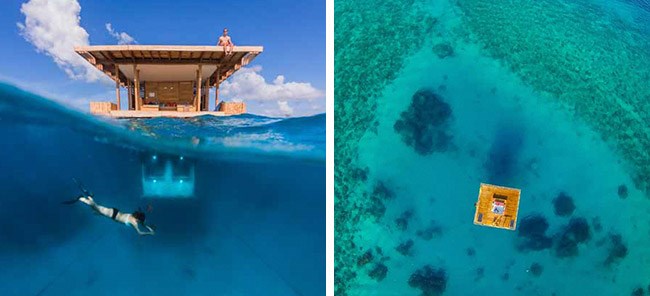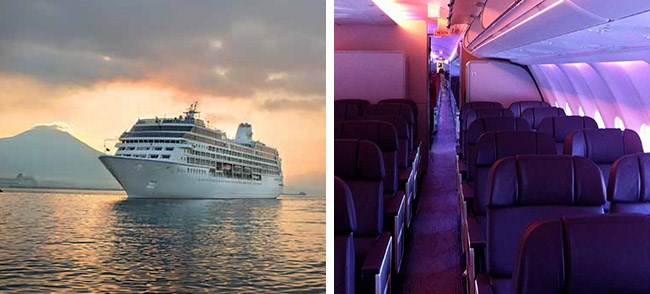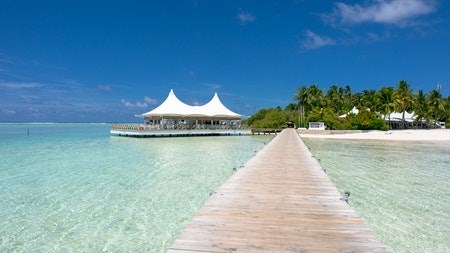From bumper cars at sea to undersea hotels, the luxury travel industry is ready and waiting to cater to the every whim of the individual.
Gazing into the crystal ball of travel is a dangerous business. If the futurists of the mid-20th century had been right, we should all be zipping around town in jetpacks and hover-cars … which clearly is not the case. But if there’s one overarching theme of the five travel trends set to be big news in 2014, it’s this: it’s all about you. What makes you happy on holiday? How can your stay be made seamless? How can hotels and airlines catch your eye… and, of course, your wallet. This year, it’s out with the masses, in with the personal.
Blinger is better
It’s a competitive space, the travel industry, and it’s not easy to stand out from the crowd. Percale linen and a celebrity chef used to be enough, but today it’s big, brash and unusual offerings that catch our eye.
The emirates Palace in abu dhabi is the world’s most expensive hotel, the 7500-room Izmailovo hotel in Moscow is the largest, while the JW Marriott Marquis in Dubai is, at 355-metres, the tallest on the planet…
But the future isn’t up, it’s down, it seems. Underwater hotels are the next big thing when it comes to getting noticed, and Africa is leading the way. The Manta Resort off Pemba Island near Zanzibar opened in 2013 with a remarkable underwater ‘room’. Truth be told, it’s actually a floating villa anchored a few hundred metres offshore: the top-deck’s for sunbathing, the ‘ground’ floor for dining and relaxing, with a sub-surface bedroom allowing you to live out that old Mafia threat of sleeping with the fishes. Other underwater hotels to watch for are the Poseidon underwater resort in fiji, which will offer 22 rooms accessible only via submarine, and the Hydropolis off the United Arab Emirates. Don’t pack your bags just yet though: Hydropolis has run into ‘technical difficulties’ that could see the $550-million resort some time in the making.
The 1888 Hotel in Sydney didn’t have half a billion dollars to spend, but has nonetheless become one of the most eye-catching properties on the planet as the world’s first ‘Instagram Hotel’. From a ‘selfie booth’ in the lobby to ‘Insta-walk’ guided tours and screens filled with images tagged #1888hotel, this 90-room boutique hotel in pyrmont encourages guests to click and share from dawn till dusk. What’s more, guests with more than 10 000 Instagram followers get a free night’s stay.
Mega-ships, mega-entertainment

It’s full steam ahead for the global cruise industry. The Cruise Lines international Association (CLIA)– an industry body representing 63 cruise lines carrying 95 percent of all passengers – forecasts that 21.7 million guests will cruise this year. A large part of that growth is thanks to the Far East, where new cruise terminals in Hong Kong and Singapore will see more and more lines catering for the insatiable Asian market.
And while the trend over the past decade has been for bigger and bigger ships, it’s doubtful any will top the 6 000-passenger oasis-class behemoths built by Royal Caribbean. Instead, cruise lines are opting to supersize the attractions on offer: enough with bigger ships; the focus now is on the bells and whistles. All eyes for 2014 are on Royal Caribbean’s Quantum of the Seas, expected to launch in November. Quantum will be the first ship on the high seas to offer a skydiving simulator, bumper cars as well as a 90-metre-high observation capsule modeled on the London Eye. The groundbreaking liner will also use LED technology to offer ‘virtual balconies’ for inward-facing cabins.
Multi-million-dollar culinary centres give any of the 1 258 holiday makers aboard Oceania Cruises’ Marina and Riviera liners the chance to participate in over 20 different interactive cooking classes (this year’s curriculum was developed by acclaimed American chef Kathryn Kelly and Bon Appétit magazine), where they learn everything from how to navigate a spice market in Casablanca to making reindeer sausage bought from a Helsinkian butcher. Each Bon Appétit Culinary Centre features individual work stations with induction cooking tops – a first at sea – and they’re proving a big hit with ocean-going epicureans.
On the technology front, many cruise lines are upping their game. Regent Seven Seas plans to make wi-Fi internet access free in the near future, while Viking ocean Cruises will follow suit in 2015. Mobile applications will soon allow cruisers to stay in touch with fellow passengers via text messaging, without incurring mobile network charges.
The other cruise trend to watch is the unstoppable growth in river cruising, with journeys on the great waterways of Europe, Asia and America proving increasingly popular. Fifteen new river cruisers hit the water in 2013, and another 25 are due to enter service in 2014. The ships are small, ensuring an intimate atmosphere, and the itineraries usually lengthy, attracting a market with plenty of time on their hands. If you tick both of those boxes, a cruise down the Rhône, Danube or Rhine may be for you.
The Goldilocks cabins

Business and First Class cabins have long been the battleground for airlines attracting corporate travelers. But as budgets get trimmed and expense accounts slashed, say hello to a new pretender to the throne: premium Economy. Offering more space than economy, but less flagrant luxury than cabins up at the sharp end, premium Economy cabins are gathering pace on airlines worldwide. Cathay Pacific introduced its goldilocks cabin in 2012, with passengers enjoying a larger baggage allowance, dedicated check-in counter, priority boarding and an upgraded meal service.
In Europe, British Airways was one of the pioneers of premium Economy and is revamping the World Traveller Plus cabins across its fleet. Virgin Atlantic has upgraded its premium Economy cabins with leather seats and a 38” pitch, while Air France’s premium Voyageur is now available on nearly all long-haul services. Lufthansa has a premium Economy cabin in the pipeline too, with bums expected to hit the seats in June 2014.
Tech gets personal
As technology comes to dominate every corner of the travel industry, so the industry’s wide reach is becoming more focused. The numbers are important, but so is the detail, as companies use advanced customer relationship management tools to fine-tune everything from how they communicate with clients to which room you’re allocated on arrival. Do you prefer a window seat or an aisle?
Hotels in particular are putting extra effort into knowing what their guests want, before they want it. From pre-arrival calls to glean the purpose of the visit, and therefore what services may be required, to post-stay follow-ups to further build a traveller profile, personalisation is key in the hyper-competitive hotel market.
Tour operator Trafalgar uses similar tactics to sustain its high level of repeat business. “We take a very personalised approach to our past passengers in that their feedback and future travel wishes are recorded and acted upon,” says Theresa Szejwallo, Managing Director for Trafalgar. “At the end of their guided holiday we enquire as to where next they would like to go and when. We log their preferences and communicate with them based on these. We’ll send them new brochures with itineraries on their desired destination. We also keep our travel agent partners in the loop.”
There’s a similar trend in the air: Ryanair has cast off its cheap-and-grumpy image and launched ‘My Ryanair’ for personalizing travel preferences, while full-service airlines such as British Airways and Emirates equip cabin attendants with tablet computers to keep tabs on customers’ individually.

Show me the experience
Been there, seen the sights, took the photo, bought the T-shirt. That’s no longer good enough as travelers increasingly want to experience, not just see, a destination. Memories are becoming the new souvenirs as we tick off ways to get under the skin of a country, whether travelling solo or in a large group.
Tour operator Trafalgar’s innovative ‘Be My Guest’ excursions are a case in point, allowing travellers to enjoy dinner in local homes with local families. On a more bespoke level, the offerings are endless: tutored wine tastings with the wine- maker, stately homes converted into charming hotels and rural home-stays. If you have the cash, concierge travel services like Quintessentially, can arrange almost anything. Gourmet tourism is a good bellwether for the rise of experiential tourism, and high-end travelers are increasingly jetting off simply to eat at the likes of Noma, The Fat Duck or El Celler de Can Roca. But if you want to keep ahead of the pack, opt for up-and-coming Scotland, with its bagful of Michelin stars, or Georgia – the one next to Russia – for organic food and a rich wine-making heritage.
What’s more, multi-generational travel is on the rise as travelers choose to experience the destination as a family. A case in point is the safari industry, where lodges are increasingly offering family suites and child-friendly programs that offer more than a pile of dusty books and games. Take acclaimed safari lodge operator &beyond’s wildchild program for instance: in addition to child-friendly game-drives, during the day younger travellers are entertained with tracking, fishing, painting and making local crafts. Crucially, as the African tourism industry looks to brazil and China for future growth, the need for multi-generational offerings will be key.
A quirky offshoot of family travel is the rise of the pank. That’s a ‘Professional Aunt No Kids’ who spends her hard-earned cash on treating nephews and nieces to ‘auntventures’ at home and abroad. Research by us company Savvy Auntie suggests there are 23-million panks in the united States, spending $9-billion a year on children. “The pank market is sizeable, has huge potential, and has yet to be exploited, especially in the travel vertical”.


